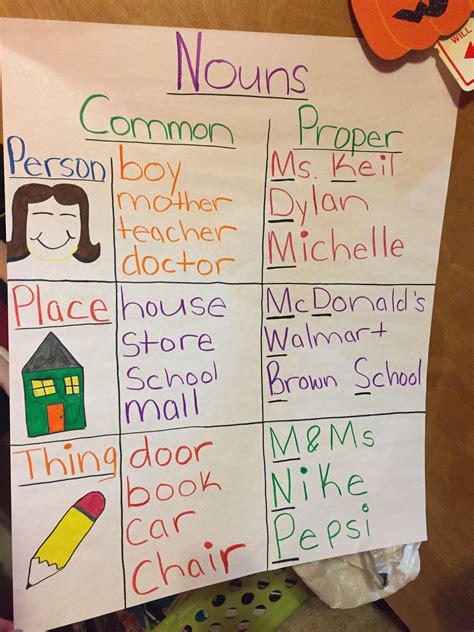Nouns are the foundation of language, the building blocks with which we construct meaning. They are the words that name people, places, things, and concepts—the nouns of our everyday lives.

A noun anchor chart is an essential tool for students of all ages, providing a visual representation of the different types of nouns and how they function in a sentence. Whether you’re a struggling student looking to improve your grammar or a seasoned writer seeking to expand your vocabulary, an anchor chart can be an invaluable resource.
Types of Nouns
Nouns come in a variety of forms, each with its specific purpose and usage. The main types of nouns include:
Common Nouns
Common nouns are the most basic type of noun, referring to general categories of people, places, things, or concepts. Examples include “dog,” “car,” and “love.”
Proper Nouns
Proper nouns are specific names for people, places, or organizations. They are always capitalized, and examples include “John Doe,” “United States,” and “Microsoft.”
Abstract Nouns
Abstract nouns refer to intangible concepts or qualities, such as “justice,” “beauty,” and “happiness.”
Concrete Nouns
Concrete nouns refer to tangible objects that can be seen, touched, or felt, such as “book,” “chair,” and “tree.”
Collective Nouns
Collective nouns refer to a group or collection of people or things, such as “team,” “family,” and “class.”
Noun Functions
In addition to their types, nouns can also serve different functions within a sentence. The most common noun functions include:
Subject
The subject of a sentence is the person, place, or thing that is performing the action. Nouns that function as subjects are typically found at the beginning of a sentence.
Object
The object of a sentence is the person, place, or thing that is being acted upon. Nouns that function as objects are typically found after the verb in a sentence.
Predicate Nominal
A predicate nominal is a noun that follows a linking verb and renames or describes the subject of the sentence.
Noun Adjective
A noun adjective is a noun that is used to describe another noun. Noun adjectives are typically found before the noun they describe.
Noun Adverb
A noun adverb is a noun that is used to modify a verb, adjective, or another adverb. Noun adverbs are typically found after the word they modify.
Tables: Noun Types and Functions
For a quick reference of noun types and functions, here are four useful tables:
| Type of Noun | Examples |
|---|---|
| Common Noun | Dog, car, love |
| Proper Noun | John Doe, United States, Microsoft |
| Abstract Noun | Justice, beauty, happiness |
| Concrete Noun | Book, chair, tree |
| Collective Noun | Team, family, class |
| Function of Noun | Examples |
|---|---|
| Subject | The dog barked. |
| Object | I love my dog. |
| Predicate Nominal | The dog is a good boy. |
| Noun Adjective | The big dog barked. |
| Noun Adverb | The dog barked at the mailman. |
Benefits of Using Noun Anchor Charts
Noun anchor charts offer a number of benefits for students and writers alike, including:
- Improved noun identification and recognition
- Enhanced understanding of noun functions
- Increased vocabulary development
- Improved grammar and writing skills
- Greater confidence in using nouns
Tips and Tricks for Creating Your Own Noun Anchor Chart
Creating your own noun anchor chart is a great way to reinforce your understanding of nouns and their usage. Here are some tips and tricks to help you get started:
- Use a variety of colors and fonts to make your chart visually appealing.
- Include examples of each type of noun.
- Define each noun function and provide examples.
- Use your chart as a reference when writing and speaking.
- Review your chart regularly to reinforce your learning.
Why It Matters
Mastering nouns is essential for effective communication. By understanding the different types and functions of nouns, you can improve your grammar, expand your vocabulary, and communicate more clearly and effectively.
Conclusion
Noun anchor charts are an invaluable tool for students and writers of all levels. By providing a visual representation of nouns and their functions, anchor charts can help you improve your noun identification, understanding, and usage. So whether you’re a struggling student or a seasoned writer, consider creating your own noun anchor chart today.
